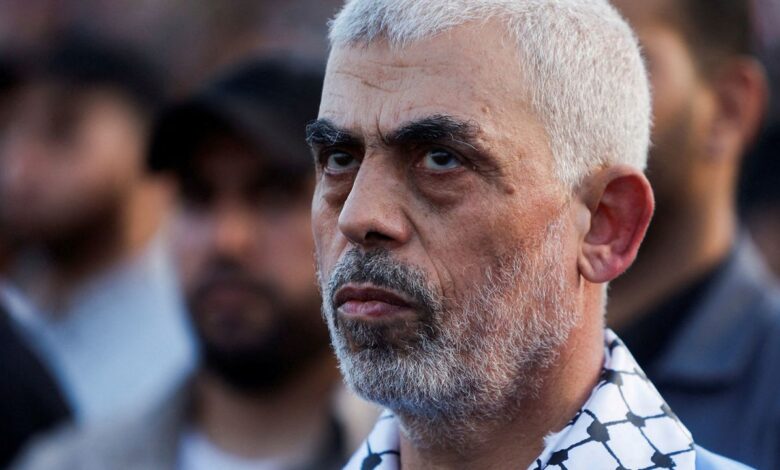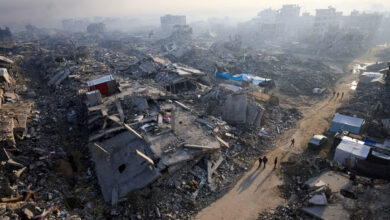
The man dubbed by Israel a “dead man walking” is dead.
Hamas leader Yahya Sinwar’s killing in Gaza is a major win for Israel following a year-long manhunt for the man believed to be the mastermind of the deadliest terror attack in the country’s history.
And it could bring the devastating war in Gaza closer to an end, experts say – if Israel and its allies can seize the opportunity.
Harel Chorev, senior researcher at the Moshe Dayan Center at Tel Aviv University, told CNN that Sinwar’s death could be a fatal blow for Hamas because of the way he ran the group.
Before the war, power in Hamas was decentralized – with Gaza political chief Sinwar just one of many leaders, Chorev said.
But that changed over the past year.
“Sinwar became the sole decision maker, and of course, he grew stronger and stronger as Israel killed more and more important figures, such as (Hamas’ military chief) Mohammed Deif,” he said.
A year of pounding by Israel, which has left swathes of Gaza flattened and killed more than 42,000 people, has left Hamas greatly weakened. Sinwar’s killing will create a major power vacuum – which Israel and its allies will no doubt aim to capitalize on.
It is unclear whether Sinwar left any instructions on what should happen in the event of his death.
Several names have been floated as possible successors, including Sinwar’s brother Mohammed, who is seen as another hardliner, and Khalil Al Hayya, chief negotiator for Hamas during ceasefire talks in Cairo. Neither has Sinwar’s public profile in Gaza.
“Israel needs to take advantage of this situation and the major confusion that is probably spreading among the ranks of Hamas,” Chorev said.
Netanyahu’s ‘political calculations’
Israeli Prime Minister Benjamin Netanyahu has insisted his goal is to eliminate Hamas completely, even though many experts have warned this may not be achievable.
Hamas might be greatly weakened, but it is still capable of firing rockets toward Israel. Meanwhile, the Israeli military recently re-entered northern Gaza, saying Hamas was reemerging in the area.
Shira Efron, a senior director of policy research at the Diane and Guilford Glazer Foundation said Sinwar’s killing gives Netanyahu the chance to claim a victory.
“They can now say ‘OK, we have won the war, we can wind down the war in Gaza and move towards a different reality on the ground,” she said.
But Netanyahu could instead frame Sinwar’s demise as the signal to intensify the conflict, she added.
“This all has to do with the political calculations of Netanyahu and his coalition,” she said.
Netanyahu has not yet outlined his government’s next steps. And while he did call Sinwar’s killing the “beginning of the day after Hamas,” he said that the war is not over.
“Today evil has suffered a heavy blow, but the task before us is not yet complete,” he said.
Sinwar’s killing could also pave the way for a hostage and ceasefire agreement, since he was believed to be one of the main blockers of a deal.
Sinwar had little personal incentive to negotiate, given that he was Israel’s No. 1 target, Chorev said.
Some hostage families are urging Netanyahu to push for a deal.
“If Netanyahu does not take advantage of the momentum and does not stand up now and present a new Israeli initiative, even at the cost of ending the war, it means that he has decided to abandon my Matan and the other hostages, with the aim of prolonging the war and fortifying his rule,” said Einav Zangauker, whose son Matan is still in Gaza.
Uzi Rabi, also from Tel Aviv University, said the hostages should now be the top priority.
“Israel must do its utmost to get them back,” he said. “Without Sinwar, it might be little bit easier.”
Speaking shortly after the announcement of Sinwar’s death on Thursday, Netanyahu appealed to the remaining Hamas fighters in Gaza.
“I call on everyone who holds hostages, whoever lays down their weapons and returns them, we will allow them to leave and live,” he said.
What happens next?
What happens next will largely depend on Netanyahu.
The long-time prime minister has been trying to juggle the demands of his far-right coalition partners with pressures from the United States and Israel’s other allies to strike a ceasefire deal and minimize the devastating cost of the war on civilians in Gaza.
At the same time, he is facing several criminal investigations and large-scale protests calling for his resignation at home.
In addition, many of Israel’s allies have criticized Netanyahu’s handling of the war, with US President Joe Biden having long voiced concerns that he may be dragging out the war in Gaza in an attempt to cling to power, something the Israeli leader has denied.
While still hugely unpopular among a large portion of Israeli society, Netanyahu has staged a remarkable turnaround over the past year, clawing back some of the support he had lost over the years.
Netanyahu has in the past insisted on Israel maintaining some military presence in Gaza after the immediate conflict is over. And some of his coalition partners have gone as far as suggesting Israel should build Jewish settlements inside Gaza.
Rabi said he believed some level of Israeli military presence would be needed to prevent Hamas from rebuilding itself in the strip – something Israel’s allies have warned the government against.
“You have to take control of the civilian infrastructure in order to empty Hamas of its authority and its legitimacy in the eyes of the Gazans,” he said.
“We should (work) with the Emiratis, with the Saudis, with the Americans and with Palestinians – other than Hamas, as to how to proceed from here,” he said. “Maybe this would be actually the opening shot for a different future for Palestinians and the Middle East.”
Defense Minister Yoav Gallant has previously criticized Netanyahu’s plan to keep Israeli military rule in Gaza, warning it would come with a heavy price.
Efron, the analyst, said Netanyahu has already gotten a boost from Israel’s successful operation targeting the leadership of Hezbollah, the Lebanon-based militant group.
The killing of Sinwar will give him another lift – and a sense of vindication, she said.
“He can now claim that everyone in the world told him not to go into Rafah and Sinwar was killed in Rafah,” she said, referring to pressure Netanyahu faced from Israel’s allies before the military launched its invasion into Gaza’s southernmost city as some 1.2 million people sheltered there.
“It doesn’t mean that he was in Rafah when the operation there started, but I think it lets Netanyahu justify his decisions in hindsight,” Efron said.
Chorev, from Tel Aviv University, added that Netanyahu could see Sinwar’s killing as a moment to cement his legacy.
Many Israelis blamed Netanyahu for the October 7 attack. It was also Netanyahu that agreed to release Sinwar from an Israeli jail in a 2011 prisoner swap – a decision that came to haunt him.
“He didn’t want to be remembered as the one who just brought about October 7, but also the one who won the war of October 7. I think for him, this might be a major achievement,” Chorev said. “And if he’s wise, he will leave the office afterwards.”
But while Sinwar’s killing may have brought Hamas to perhaps its weakest moment, destroying the militant group will not by itself guarantee a peaceful future. Israel has killed several Hamas leaders in the past and the group has always managed to recover.
Senior Hamas official Basem Naim alluded to the group’s determination to keep fighting, saying on Thursday that while Sinwar’s death was “painful and distressing,” the group would be “eventually victorious.”
Meanwhile, Israel’s intense bombardment and deadly ground operation has turned most of Gaza into a wasteland. Thousands of children have been orphaned, maimed and traumatized.
Israel now needs to ensure they can have a better future – otherwise it risks creating another generation susceptible to radicalization.
This story has been updated.



